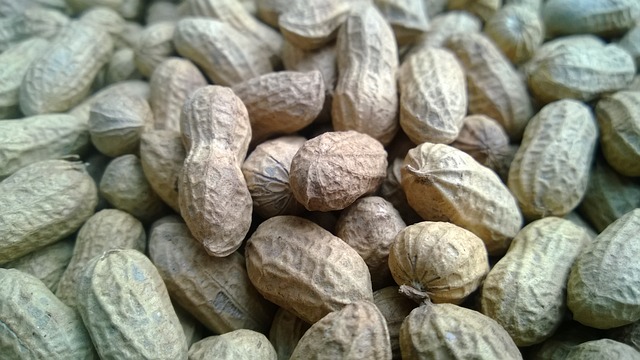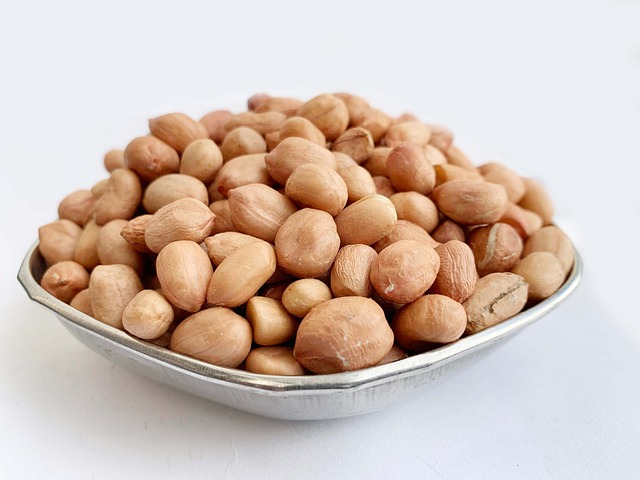Groundnuts, commonly known as peanuts, are a popular legume that is widely consumed around the world. Soaked groundnuts, also known as peanuts, can offer several health benefits. Here are some potential advantages of consuming soaked groundnuts.
- Improved Digestibility: Soaking groundnuts can help reduce the levels of anti-nutrients such as phytic acid. These compounds can interfere with the absorption of minerals like iron and zinc. Soaking can make these nutrients more bioavailable and enhance their absorption.
- Increased Nutrient Absorption: Soaking can also activate enzymes that break down complex compounds, making the nutrients in groundnuts more accessible for absorption. This can enhance the nutritional value of the nuts.
- Antioxidant Content: Peanuts are a good source of antioxidants, including resveratrol. Soaking may help release these antioxidants and make them more available for the body to use. Antioxidants play a crucial role in neutralizing free radicals, which can contribute to various chronic diseases.
- Aids in Weight Management: Some studies suggest that nuts, including peanuts, can be beneficial for weight management. The protein and fiber content in soaked groundnuts can contribute to a feeling of fullness, potentially reducing overall calorie intake.
- Heart Health: Soaked groundnuts contain monounsaturated and polyunsaturated fats, which are heart-healthy fats. These fats can help lower bad cholesterol levels and reduce the risk of heart disease.
- Blood Sugar Control: Groundnuts have a low glycemic index, and the fiber and protein content can contribute to better blood sugar control. However, moderation is key, especially for individuals with diabetes.
- Rich in Nutrients: Soaked groundnuts are a good source of various essential nutrients, including protein, healthy fats, vitamin E, niacin, folate, and minerals such as magnesium, phosphorus, and potassium.
It's essential to note that while soaked groundnuts can offer health benefits, moderation is crucial as they are calorie-dense. Additionally, individuals with nut allergies should avoid consuming peanuts. As with any dietary changes, it's advisable to consult with a healthcare professional or a nutritionist for personalized advice based on individual health conditions and needs.

Here are some key points about groundnuts:
- Botanical Classification: Despite being referred to as nuts, peanuts are not true nuts. They belong to the legume family, along with beans and lentils. The scientific name for peanuts is Arachis hypogaea.
- Growing Conditions: Peanuts grow underground, and the plant produces yellow flowers that develop into "pegs" that penetrate the soil. The peanuts develop underground from the pegs.
- Nutritional Content: Peanuts are a nutritious food and a good source of protein, healthy fats, vitamins, and minerals. They contain essential nutrients such as niacin, folate, thiamine, riboflavin, vitamin E, magnesium, phosphorus, potassium, and zinc.
- Health Benefits: Consuming peanuts in moderation can have various health benefits. They are known for their heart-healthy monounsaturated and polyunsaturated fats. Peanuts also provide a good amount of protein, making them a valuable food for vegetarians and vegans.
- Protein Source: Peanuts are an excellent plant-based source of protein. They contain all the essential amino acids, making them a complete protein source.
- Antioxidants: Peanuts contain various antioxidants, including resveratrol, which is also found in red wine and has been associated with heart health benefits.
- Healthy Fats: The fats in peanuts are predominantly monounsaturated and polyunsaturated fats, which are considered heart-healthy. These fats can help lower LDL (bad) cholesterol levels.
- Versatility: Peanuts are incredibly versatile and can be consumed in various forms, such as raw, roasted, boiled, or as peanut butter. They are also used in cooking and baking and are a common ingredient in many cuisines.
- Allergies: Peanut allergies are relatively common and can be severe. It's important for individuals with allergies to avoid peanuts and products containing peanuts.
- Economic Importance: Peanuts are a significant cash crop in many parts of the world. They are used not only for direct consumption but also in the production of peanut oil, and the by-products are used as animal feed.
Remember that while peanuts can be a healthy addition to a balanced diet for many people, individual dietary needs vary, and those with allergies or specific health conditions should consult with a healthcare professional or nutritionist for personalized advice.
News, Health, Travel & Entertainment Telegram Channel Click to Join Infimor
